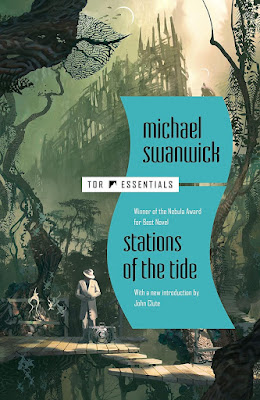.
John Barth died recently and I very much wanted to do an appreciation of his work.
But there was a problem.
Giles Goat-Boy was the first Big Fat Literary Book I ever tackled. This was back when it first came out, and I was fourteen. So it was an important book for me. Unfortunately, it contained a black character, an apish, indiscriminate rapist so unpleasantly drawn that it took me aback. Even then, when I knew nothing about race and sex and people, this portrayal seemed... strange? ...cruelly caricaturish? ...offensive? Ultimately, I shoved it aside, figuring I'd understand it better when I knew something about race and sex and people.
Now that I know, perhaps, something about race and sex and people, I recognize the character as a failed attempt at satire and irony. But that doesn't make it any less loathsome.
Barth was in his day considered a major writer and definitely, at a minimum, Canon track. The Sot-Weed Factor, whose young protagonist, Ebenezer Cooke, signs himself "poet and virgin" and becomes the Poet Laureate of colonial Maryland, was a wonderful creation. But I didn't have the time to reread that discursive treasure chest of prose, so I determined instead to write about "The Dunyazadiad," one of three novellas in Chimera.
I loved the premise, which was that Sheherazade of the Thousand Nights and a Night was, with the help of her sister Dunyazade, anachronistically trying to solve, with yellow pads and sharpened pencils, the problem of Sharyar raping and killing a virgin a night when a Genie appears who knows the solution because he's John Barth himself. Who has for most of his life loved the book which she will be the heroine of.
Much of what ensued consisted of Sheherazade and Barth wonking about writing fiction. Catnip for a gonnabe writer like me. At one point Barth and Scherazade talked about framing a story and speculated that it might be possible to frame a story from inside. Which is, extraordinarily, what The Dunyazadiad accomplished.
But right in the middle of this fantasia of rowdy sex and literature is the following sentence fragment: ...and found my sister-in-law cuckolding my brother with the blackamoor Sa'ad al-din Saood, who swung from trees, slavered and gibbered, and sported a yard that made mine look like your little finger.
Eek.
I couldn't exactly present this story to you, saying, "Drink deep of this lovely story. It's only got one racist turd in it." So I gave up on writing a memorial until I could come up with something a little more nuanced. This post, I hope.
There is a lesson here for gonnabe writers: Don't punch down. Be wild, be free, be daring, don't hesitate to lambaste those in power. But don't punch down. Satire is a tool to be used against those with power and pretension. Don't employ it against those who have neither. John Barth did, and as a result we all think the less of him--and, more importantly, his work--because of it.
End of sermon. Go thou and sin no more.
And speaking of John Barth . . .
I met him. My senior year at William & Mary, he entranced a crowded auditorium with a reading from The Dunyazadiad. His voice soft with love, he read, "'All those nights at the foot of that bed, Dunyazade!' he exclaimed. 'You've had the whole literary tradition transmitted to you--'" Here, he paused to let a smutty laugh pass through the audience before continuing, "'and the whole erotic tradition too!'" He knew how to read a story, and how to play the audience as well. Like a trout at the end of a line.
Afterward, the English Department had a gathering (seniors only) in his honor. I stood by, awestruck and silent, as he and Dr. David Clay Jenkins discussed colonial governor Francis Nicholson. "What a mean man!" Dr. Jenkins exclaimed.
"Yes," Barth agreed, "but he had something."
And that simple exchange epitomized for me why it was I had sunk four years into obtaining a liberal arts education. So that someday I could talk as knowledgeably about esoteric matters with intelligent strangers.
*










